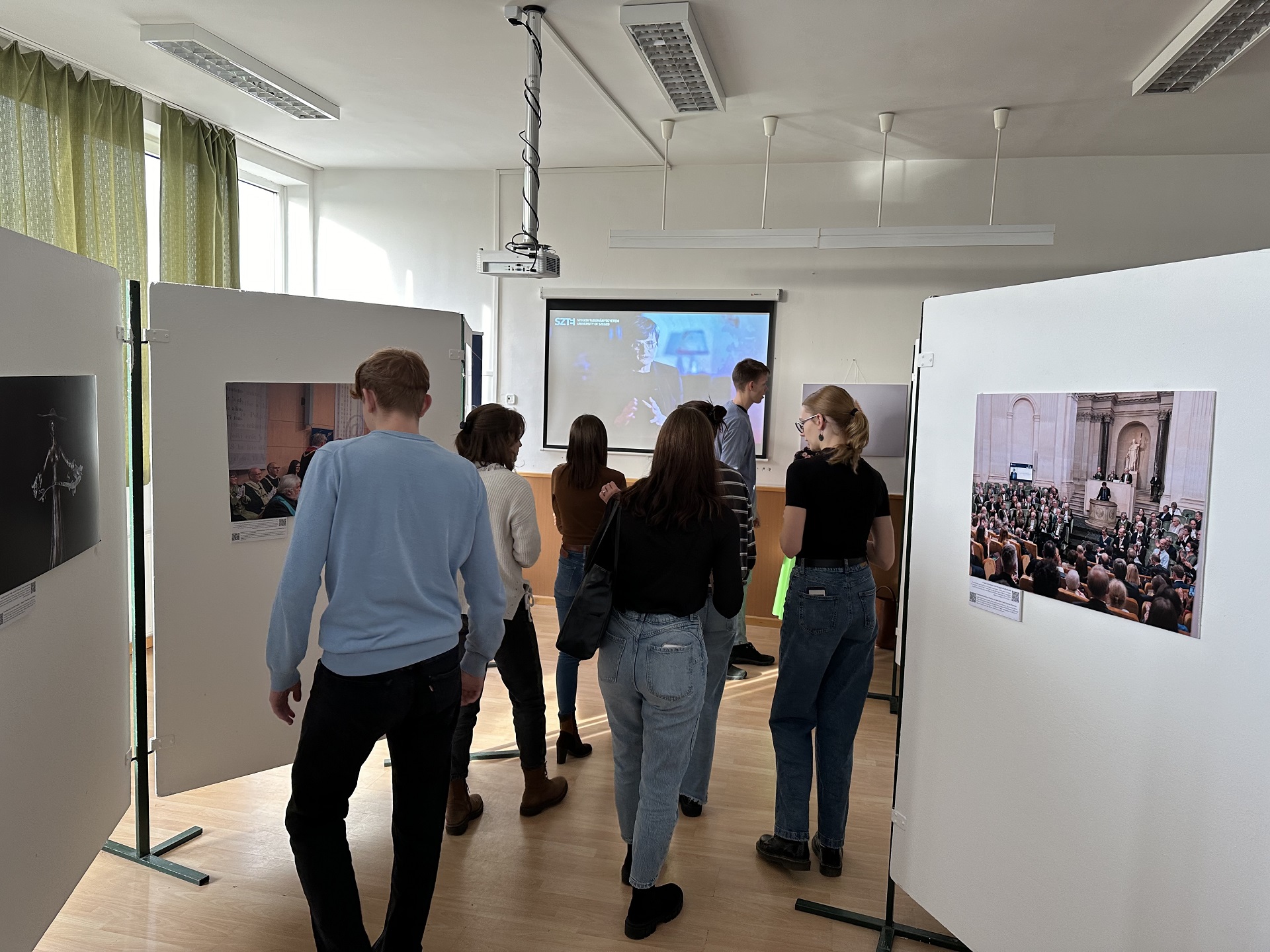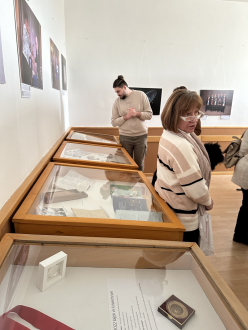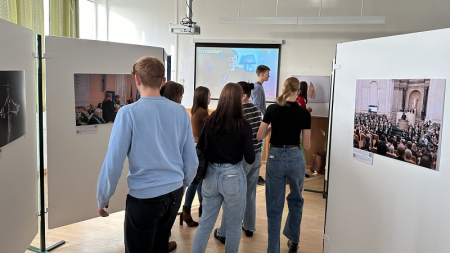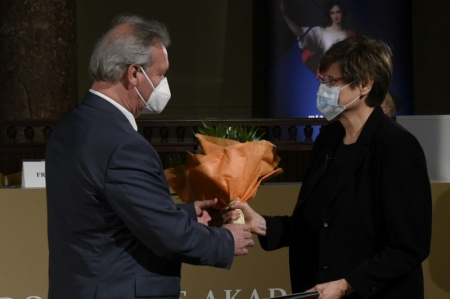Katalin Carrico dedicated her autobiography “Breakthroughs – My Life and Science” to the students of Lovasi High School. The leaflet bearing the signature of the Nobel Prize-winning scientist and his previous book was handed over to Zoltan Schulz, principal of Veszprém High School, by his former university colleague, János Giesi. The traveling exhibition of the University of Szeged was also discussed in the conversation between the professor who also graduated from the University of Szeged and taught mathematics and computer science and the biologist turned versatile artist.
After a greeting from the principal of László Lovasy High School in Veszprém, Zoltan Schulz (right), Tunde Braznovski, a former student of the school, opened the SZTE exhibition entitled “Katalin Karicó’s Path to the Lasker Prize and Beyond”. Photo: Istvan Sahin Toth
At the tenth station
In the presence of Katalin Carrico, the touring exhibition was opened on 8 December 2022 at the Attila Josef Study and Information Center of SZTE. The exhibition titled “Katalin Carrico’s Journey from Academic Competitions to the Lasker Prize” has been enriched with new and fresh elements in the nine stops so far. By the time he reached the tenth station, Veszprém, his address had to be changed. The title “Katalin Karikó’s Journey to the Lasker Prize and Beyond” expresses that in Veszprém, which has been awarded the title of “Cultural Capital of Europe”, Nobel laureate Katalin Karikó’s latest awards are also discussed during guided tours.
– She returned to the laboratory, repeating the experiment if necessary to make it perfect and to get a better score on her index – described Katalin Karicó’s former colleague at the University of Szeged, Tunde Braznovski. The candidate of biological sciences, a former student of Lovassy László Gymnázium in Veszprém, recommended the University of Szeged exhibition entitled “Katalin Karicó’s path to the Lasker Prize and beyond” to the interest of those interested.
Tunde Braznowski added his experiences during his university years in Szeged with personal stories. He said: He first met Katalin Carrico in 1973, before the written entrance exam. The two tall girls stood next to each other, measuring each other’s centimeters…
– At that time, only ELTE and JATE, that is, the universities of Budapest and Szeged, advertised biology majors. I wanted to remain a country girl, which is why I applied to Szeged – explained the motives of the former Lovassy student. – In the Hermann dormitory, where most of my group mates lived, I was just a guest. They were all together, so it was more difficult for me, the subtenant, to be accepted by the team. Of course, we were often together in lectures and practices. During the laboratory exercises, I was able to make particular use of my knowledge of mathematics, which I gathered here at Lovasi High School – the graduate praised his alma mater. At the opening of the exhibition, Catalin Carrico discussed the key stages in her life.
Nobel School Weeks
Catalin Carrico financially supported the talent development program of the National Foundation for Medical Biology, which started from the university ranks in Szeged. On December 13, 2023, the organization’s National Scientific Training Academy, which has grown into a national network, will introduce it to the students of Lovasi High School Randy Schekman The Nobel Prize-winning professor and his wife, Sabiha Merchan currency. The guests don’t know Katalin Carrico personally, but some of the awards connect the scientists.
In a traveling exhibition, SZTE displays documents of Katalin Carrico’s school years, press photos taken at award ceremonies, her most interesting awards and publications published since 2022
At the Katalin Karikó exhibition opened under the auspices of SZTE, the American cell biologist Randy Schekman will be able to recognize the Canada Gairdner International Prize he received in 1996, which he presented at Veszprém in the form and beauty of a piece of art. On 5 April 2022, it was announced that the research professor at the University of Szeged has been selected as one of the most innovative and distinguished medical biologists in the world, Catalin Carrico. Senior Vice President of BioNTech, and Assistant Professor at the University of Pennsylvania (UPenn). Drew Wiseman“Roberts Family Professor” at UPenn, respectively Peter Collis, a professor at the University of British Columbia, also won the prestigious Canadian award. According to the joint praise of the three researchers, the award was given because they “carried out pioneering work using nucleoside-modified mRNA and liposome nanoparticles (LNP), developing the delivery of active ingredients and the core technology for a highly effective COVID-19 virus.” mRNA vaccines.
Part of Girdner’s story is also told in the exhibition guide, Catalin Carrico from October 24 to 28, 2022. During Girdner Science Week between 2010 and 2016, he spoke to Canadian high school and university students, women and researchers about his life’s journey and the results of his research related to the amazing molecule mRNA, and the potential for therapeutic development of messenger RNA. He also participated in the presentation presented by the President of the Republic, Katalin Novak. At the culmination of the program series, at the Canada Gairdner Awards, part of the song “Diamond and Gold” was also played…
The Lovassy High School Fair champion and guest on Dec. 13 will be tied for additional prizes. Katalin Carrico and Randi Schekman have already received the Albert Lasker Prize, also known as the US Nobel Prize, for basic medical research, the Louisa Gross-Horwitz Prize, and the Nobel Prize in Physiology or Medicine.
The network of contacts between researchers is strengthened by the fact that Catalin Carrico, Randy Schekman, and Sabiha Merchant are members of the To the US National Academy of Sciences. In addition, both researchers were previously elected German National Academy of Sciences in Leopoldina member.
From the “Collection of Awards” by Catalin Carrico in Veszprém – in addition to the Canadian Prize – you can admire a beautiful medal received on the occasion of the XXVIII General Assembly of the Vatican Pontifical Academy for Life; Neil Nathanson Memorial Lectureas well as a commemorative medal “Hungarian invention serving as the basis for mRNA-based vaccines”, which was made at the request of Magyar Nemzeti Bank (MNB) and Magyar Pénzverő Zrt. Andras Selos Industrial artist designed…
Such and similar stories can add color to the “Nobel Weeks” in Veszprem. We recommend to visitors of the Veszprém Gallery who are trying to discover the following video:
Festive performance by Catalin Carrico At the 194th General Assembly of the Hungarian Academy of Sciences.
At the 194th General Meeting of the Academy, the distinguished graduate of Lovasi High School, Tamas FreundThe President of the Hungarian Academy of Sciences greeted and welcomed Katalin Karikó
Extraordinary lessons
The SZTE exhibition, aimed at high school students and teachers, also drew attention to the importance of research work by the fact that after the opening, Tunde Braznowski, a graduate of the institution and the University of Szeged, held an unusual class at László Lovacy High School: 50-year-old About the Biological Research Center in Szeged Presenting changes in the history of science through storytelling.
– I wrote my diploma thesis as a researcher in the genetics of Muslika. As an employee of the Szeged Biological Centre, I switched to plant genetics, then to mammalian genetics – Tunde Braznowski outlined the twists and turns of his early career. The former student of Lovassy High School in Veszprém told the story of how he became a candidate in biological sciences during an unusual semester.
Many Veszprém students today are interested in biology and research.
– What led to the “explosion of biology”? What are the recurring research topics? Why was the Szeged Biological Center a great place to work? The scientist listed the ideas for the topic of the conversation. Finally, he answered the third sentence with a question mark.
United Nations Development Programme, that is United Nations Development Programmeas well as UNESCO, that is United Nations Educational, Scientific and Cultural Organization It was built with assistance and delivered in 1973 to Biological Center in Szeged, SZBK building in Újszeged. The two international organizations also had the opportunity to influence what happened there. Szent-Györgyi’s student, Academician Straub F. Bruno, who was abroad, was given the opportunity to live in the modern building. Aside from this fact, the business style was mostly characterized by the atmosphere of tea at five o’clock.
– We were in Berto with the group leader, then with the director. “From the political situation to the cultural situation to scientific problems, we raised and discussed all the topics we were interested in at the five-hour tea party,” Tunde Braznowski said. – We also discussed, for example, in 1978, when I became an employee of SZBK, what amount of $70 each researcher at SZBK received was enough to order materials for his research work from a foreign company. Even then, this was a very small amount, and you had to say a year in advance what the person wanted to spend it on. But the researcher cannot predict this much if he really wants to follow the path that the experimental results show him.
Tunde Braznovsky participated in the creation of artificial chromosomes for the purpose of gene therapy. He talked about the difficulties of patenting, the relationship between pharmaceutical companies and researchers, and misconceptions about gene editing.
– You should learn how the human body works in biology class! You need a good education to be interested in biology, which represents a wealth of opportunities, the biological sciences candidate emphasized. 19 of us graduated as JATE students in Szeged. Now there are 200 students in the classroom, but every biologist can get a place. From health care to water, biologists are in high demand.
*
As part of the “Nobel Weeks Awareness Campaign”, the series of extraordinary lessons will continue in Veszprém: you can talk to the multi-talented artist János Gysi, on December 15, 2023.
At Lovassy László Gimnázium, we also welcome students from other schools on guided tours starting on December 15, 2023 at 12:00 and 1:00 pm, where we can talk about behind-the-scenes stories of the Nobel Prize ceremony.
Ilona from New Saxony
Photos: Istvan Sahin Toth















































